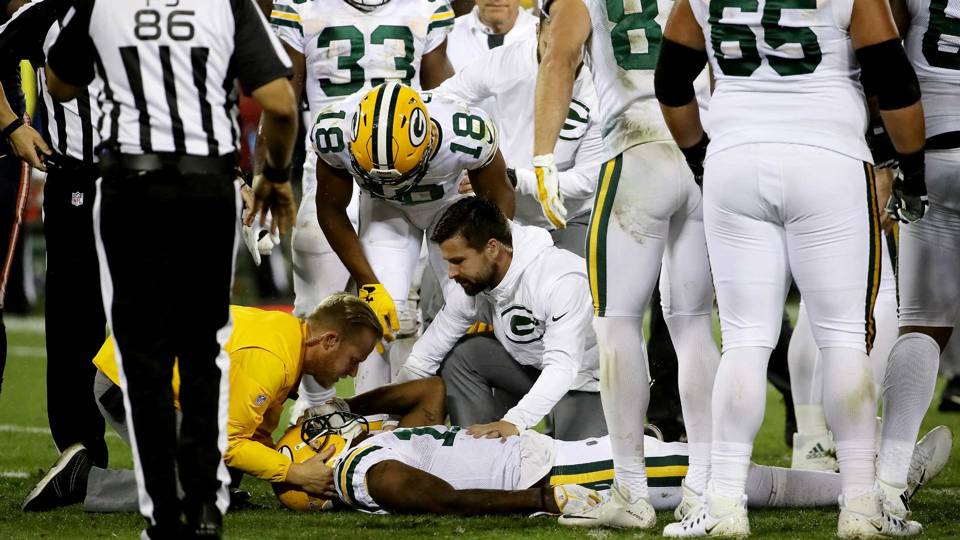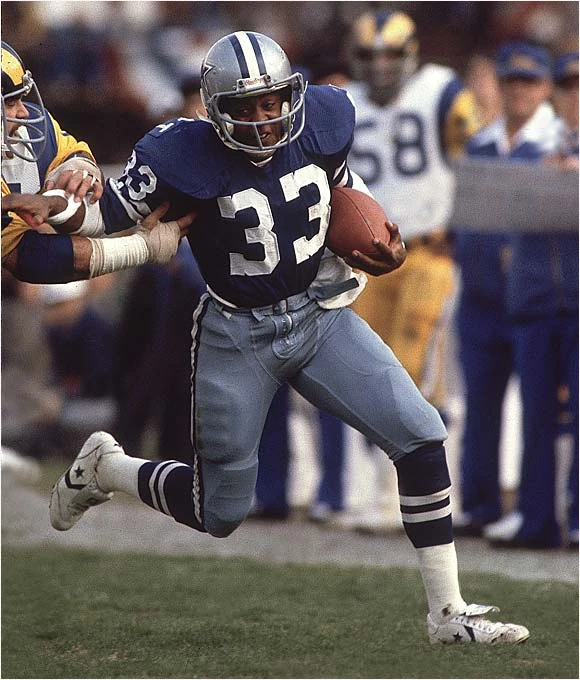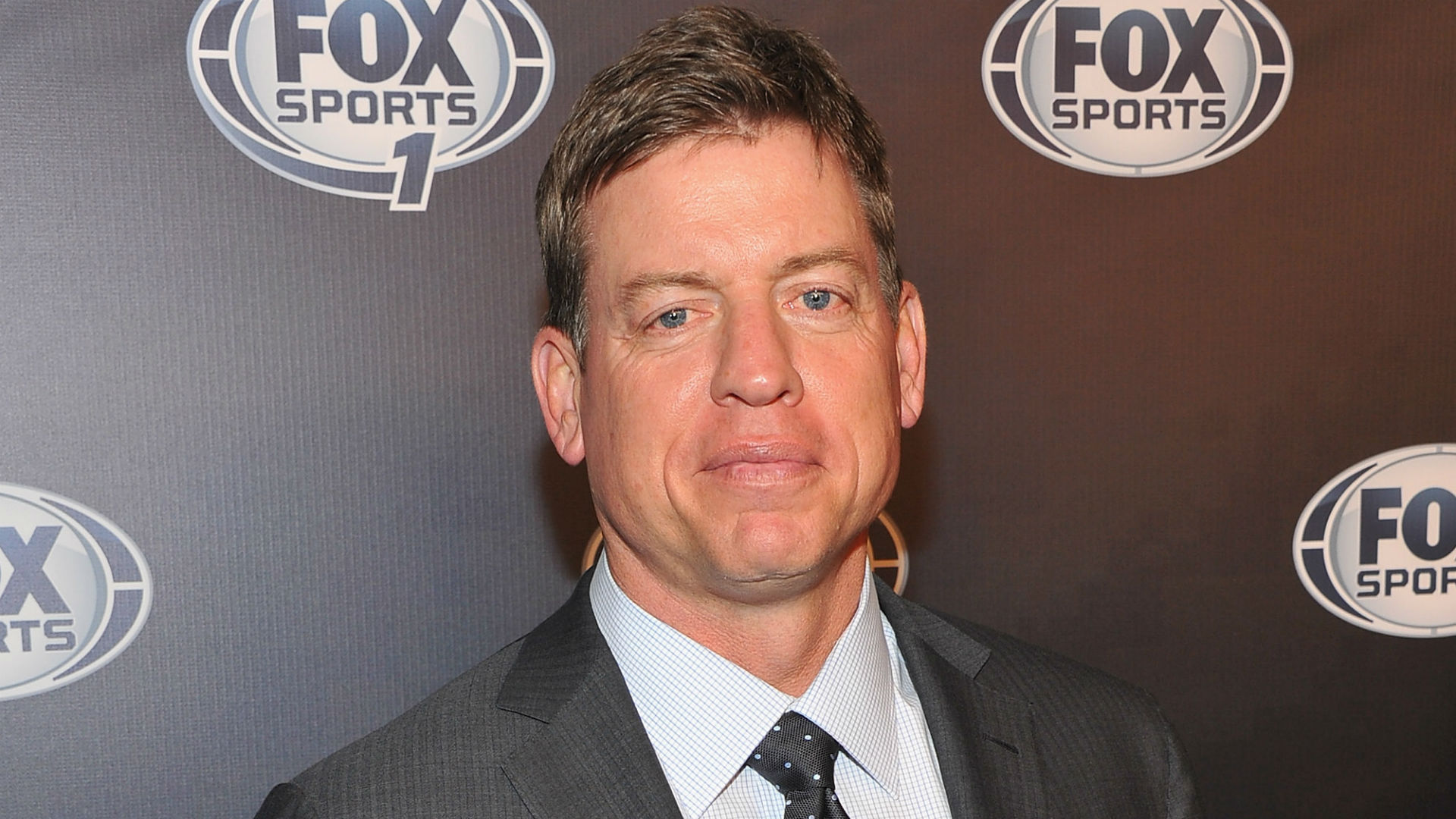Last weekend, for the first time in almost thirty years, I turned the TV off during a good football game. I felt sick to my stomach. And it had nothing to do with Colin Kaepernick.
It was a college game, and in the span of about 20 minutes, I watched two different young men get hit so hard that they had to be carried off on stretchers. Both times the game stopped for ten minutes, as players circled around and dropped to a knee — a gesture that’s explosive during the national anthem, but dead-somber during an injury stoppage. Some players clasped hands. It was like a prayer vigil. I’d seen gesture before, but never really thought about it. But now it was clear: It was like they were praying their teammate wasn’t dead or paralyzed.
And so — for the first time — was I.

Normally you don’t give much thought thought to football injuries. You cringe a little at the replays, then you wander into the kitchen for more nachos. The guy is carted off, gives the crowd the thumbs up sign, and you don’t think about him again (unless he’s an important player for your team — then you worry not about him but about the team).
But this time, I worried about him. Those ten minutes he lay still were excruciating. So were the replays: the body wrenched back, the head bouncing off the turf, the arms and legs gone motionless. I found myself searching frantically for any sign of movement. “Give me something — anything!” I kept thinking. A foot? He’s not paralyzed! A hand? He’s conscious! By the time the second kid was carted off, I had thoughts running through my head that I’ve never thought before during a football game:
“What kind of long-term damage will that cause?”
“That was like a car accident. How have I been watching this all these years?”
“They’re just kids . . . ”
It was weird. That’s when I switched off the television.
***
But why? Why do I suddenly feel this way after 27 years of ardent football viewing?
Maybe it’s because I’ve so many former students in college right now. Maybe it’s because as you get older, you start to consider the long-term consequences of your actions, especially when it comes to taking care of your own body. Maybe it’s because at 35 I’m starting to realize that life isn’t quite as vast and inexhaustible as it seemed at 19. You get older and you start to pay for what you once did. Every time I prop my left elbow up in the car, I squint in pain and remember that time I didn’t wear elbow pads while whitewater kayaking. Small stuff — but it stays with you. Like the scars on my hands from years of kayaking, you only have one body, and some of that stuff never really goes away.
And what if your injuries are so bad that they could reduce the length of your life? Or the coherence of your mind?
As I looked at those college players, I didn’t see immortal gladiators. I didn’t even see grown men. I saw boys — 19, 20 years old — beating the hell out of their brains and their bodies and wholly uninformed about the long-term consequences of doing so. I didn’t see glory or immortal deeds — I saw a lot of guys who are going to need a lot of medical care.
For the first time in my life, faced with the violence of football, I flinched.
***
They say there’s nothing like seeing world class athletes up close, sitting right in the front row for a game. That’s the dream for sports fans, right? I’d LOVE to sit courtside for an NBA game someday. But a football game? I couldn’t do it. I’d wince. Today’s players are so big, so fast, and so chiseled that watching them collide at top speed is hard enough on TV. Being in the front row? That’d be like a roadside seat for a car crash. Not breathtaking — disturbing.
I never imagined I’d get to this point. I grew up watching football. I got sucked in back in 1990, following the New York Giants with my father as they made an epic and wholly unexpected run to the Super Bowl and hooked me into the sport for good. Over the next few years, we watched countless Giants games on TV, even attended a few in New Jersey, and I became the ringleader of a huge, swirling recess football game. My ambition then, like so many other young boys, was to play quarterback in the NFL like my heroes — Phil Simms, Joe Montana, and Randall Cunningham.
Now this wasn’t realistic in the slightest. For one thing, I’m built more like a middle distance runner than a quarterback. But when you’re a kid, you don’t think that way. You don’t look over at your father, who weighs all of 140 pounds, and think, “Maybe I should go into something with a little less contact, like real estate law.” I was also hampered in my dream because my hometown didn’t offer youth football. By the time I arrived at a high school that did, I’d already realized that some guys were meant to be slammed underneath a pile of 200 pound men . . . and some guys were meant to play soccer.
But I kept watching. For me, fall has always been about 40% better because of football. I feel the air get cold, the leaves start to turn red, and I am definitely — as the song goes — ready for some football.
But as of last week, it feels like something is changing.
***
I wonder if my evolution on this topic mirrors lots of other fans’. It was hard not to keep watching during the Manning-Brady era. But it was also hard not to notice when an NFL war hero like Mike Webster started losing his faculties, or when a beloved All-Pro like Junior Seau committed suicide — and both men were confirmed victims of a newly-recognized brain disease called CTE. For a while, I rationalized it. Look at some of those old guys: they’re fine. But then you start seeing more guys like Tony Dorsett or Jim McMahon, slipping into incoherence. Dorsett’s quote is heartbreaking: “I signed up for this when, I guess, I started playing football . . . But, obviously, not knowing that the end was going to be like this.” How tragic.

But now we do know that it ends like that. With the evidence piling up that playing football is incredibly hazardous to your long-term health, it’s getting harder and harder for me to justify still watching the sport. I know a lot of people have been up in arms about the players’ protests, acting like that’s going to turn viewers off to the sport, but that’s way off. The real story is that it’s the violence of the game that’s going to be its undoing. For the first time last weekend, I saw — quite clearly — the coming of the end for America’s most popular sport.
***
It’s even hard for me to watch former players on TV, knowing what’s likely around the corner. I recent study of players’ brains revealed that 110 of 111 of them demonstrated signs of the dreaded CTE. It’s not even probable that these ex-quarterbacks and receivers have symptoms; it is — quite literally — a mortal lock.
And despite the persistent stigma of the “dumb jock,” the fact is, a lot of football players who’ve become familiar fixtures of my living room since 1990 are incredibly intelligent and articulate. That’s why it’s so hard for me to watch them on TV: “Sure, they’re alright now,” I find myself thinking, “but how long before they start forgetting where they live?”
Take Troy Aikman, currently the lead broadcaster on FOX. Being a commentator is thankless, but I’ve always respected Aikman’s preparedness and professionalism. He’s sharp. But you can almost feel the darkness coming. Back when I was a kid, Aikman was almost as famous for suffering concussions as for winning Super Bowls. He had so many that he inspired sportswriter Bill Simmons to joke about the “Troy Aikman Face”: basically poor Aikman staring blankly into the middle distance after another concussion as trainers held powerful smelling salts directly under his nostrils, producing no effect. That’s the Aikman Face. Whether you like his commentary or not, in his early 50s Troy Aikman is still incredibly sharp and intelligent. But I can’t help wondering — for how much longer?

Right now, football sort of feels like smoking must have in the 1960s. Instead of cancer, it’s permanent brain damage. And instead of Big Tobacco, it’s the NFL that’s trying to cover it up. First it was Roger Goodell trying to downplay the risks, now they’re desperately trying to legislate the game to make it safer. But that’s like trying to make cigarettes safer with filters. Nicotine is still nicotine and violence is still violence.
***
Since 1958 when Alan Ameche plunged over the goal line to secure a dramatic overtime victory for the Baltimore Colts in the 1958 NFL Championship game, football has surged past baseball to claim status as our true national pastime, and entrenched itself firmly at the top of our sports hierarchy. For most of my lifetime it hasn’t even been close.
Why?
There are a lot of reasons we love football.
We love to savor situations: fourth and goal from the two, 30 seconds left, no timeouts, what do you do? Football is game of inches, yes, but it’s a game of inherently dramatic set pieces.
We love football’s militaristic overtones: the blitzes, the offensive drives, the last stands, the field generals. We love the brotherhood, the manly valor, the intricate tactical strategizing.
But make no mistake — we love the hitting. There is something cathartic about the sheer violence of our favorite entertainment — in our movies, in our video games, and in our sports. We all have people we’d love to hit. Who hasn’t wanted to lay out that obnoxious coworker, or that tailgating driver? Of course in civil society we can’t — so we take pleasure in watching our favorite players do it. When your favorite defensive end levels that smug quarterback, it’s like your smug coworker getting hit. We sit on the couch, we drink beer, and we cheer thunderously for the violence that we wish we could get away with. It’s more than escapism. It’s violent fantasy.
But what about the victims? And what about the aggressors? Today my favorite defensive end from childhood is slowly slipping into a hell of memory loss and erratic behavior.
What does it say about us? Will future generations look back on us as hopelessly unethical, taking pleasure in watching huge men brain damage each other at young ages? Will they judge us? Perhaps. Predicting the moral outrage of our grandchildren is never easy, but it’s safe to say they’ll find something, and right now football feels like a pretty sure bet for the distaste of our progeny.
Have I quit watching the game? Absolutely not. It’s been a long time since I was throwing spirals at recess, all 85 pounds of me, but in the meantime the game has given me some of my most memorable TV watching experiences. Last February I’d turned the TV off and gone upstairs to bed, only to hear a voice in my head say, “Wait a minute. They’ve got Tom Fucking Brady . . . ” — before racing back downstairs just in time to watch that heart-stopping, once-a-generation comeback. I’ll remember that one forever. At its best, football players become gods whose deeds become immortal. It’s the Greek drama of our time. It can bring people together — in locker rooms, in bars, in stadiums, across political divides, across cultural lines, old and young, white and black. Anyone who remembers what the 2006 champion Saints did for a flood-ravaged New Orleans knows the power of football to unite, to uplift, and to heal.
And yet, I keep thinking about 50 year-old Troy Aikman, with all those concussions stalking his sanity. I think about 24 year-old Davante Adams lying face-down on the turf last week after a truly sickening hit. I think about the countless high school students I’ve had who’ve spent weeks fighting pounding headaches, light sensitivity, even short-term memory loss.
Despite my childhood dreams, I never got to be a “real” quarterback. I never even got to play in a real football game. But it’s hard not to look at the violence of the today’s game and wonder if that wasn’t a lucky break. And even though I still love the NFL, and even though I haven’t stopped watching yet, sometimes it’s getting harder and harder not to look away.